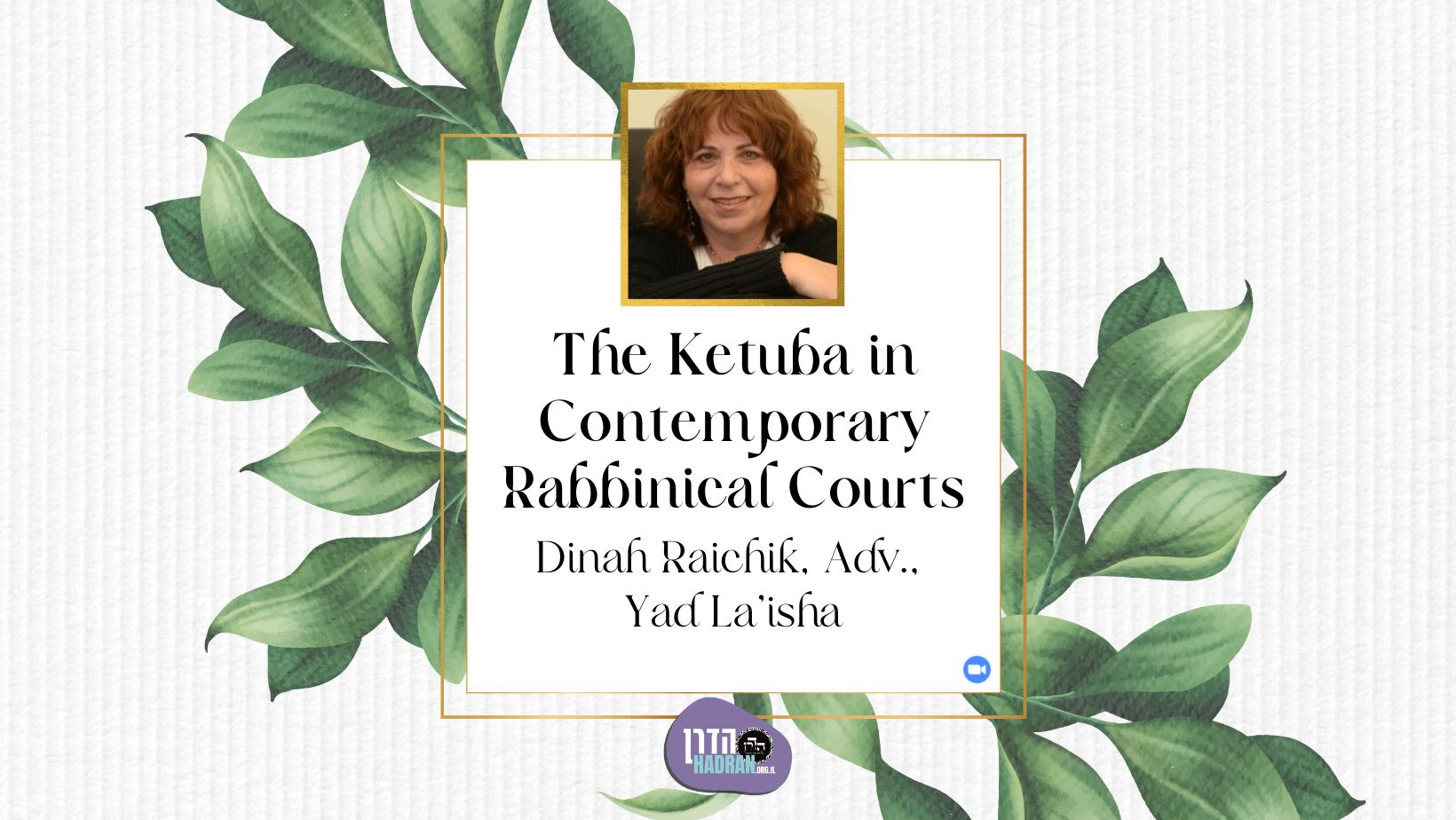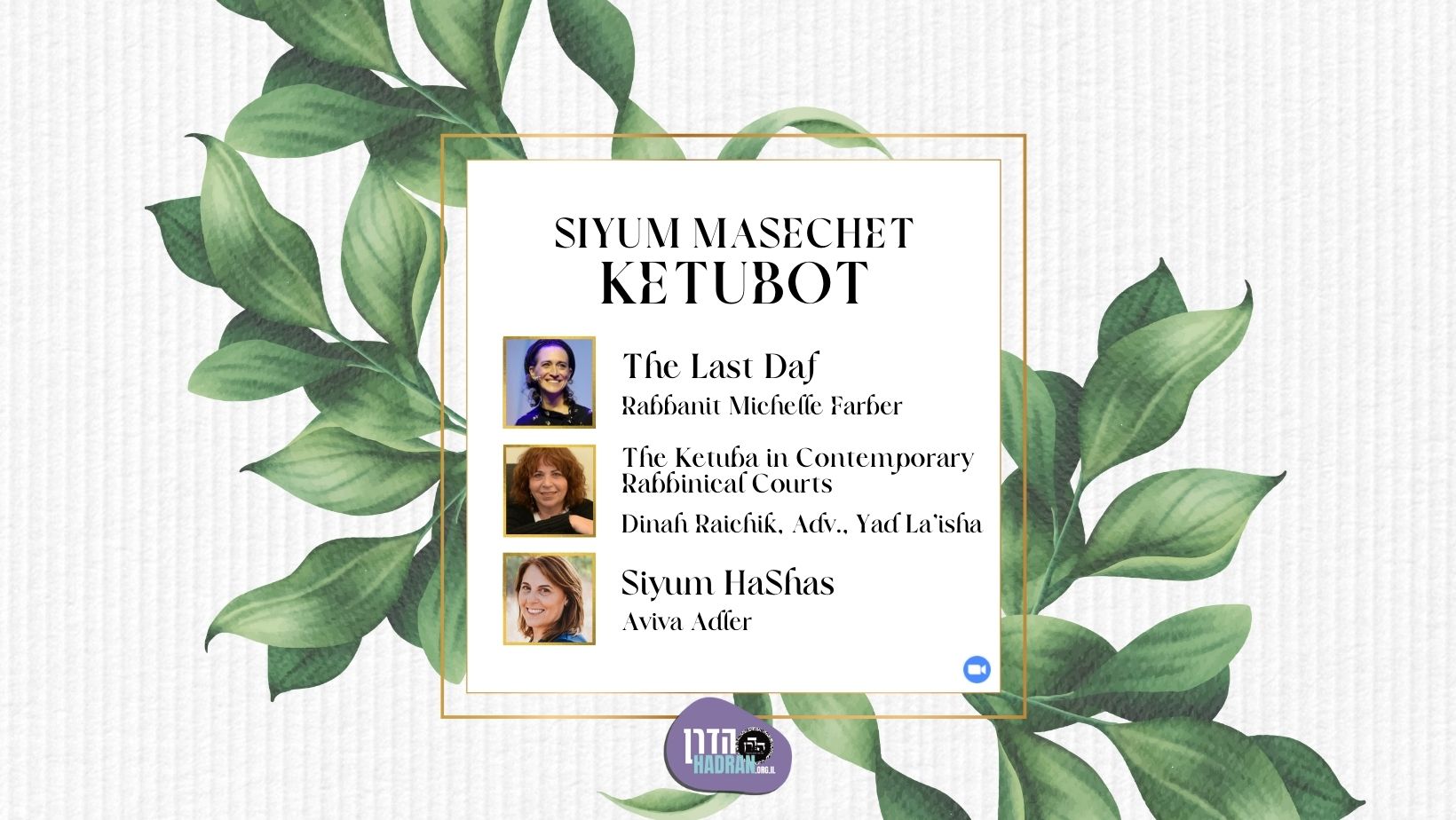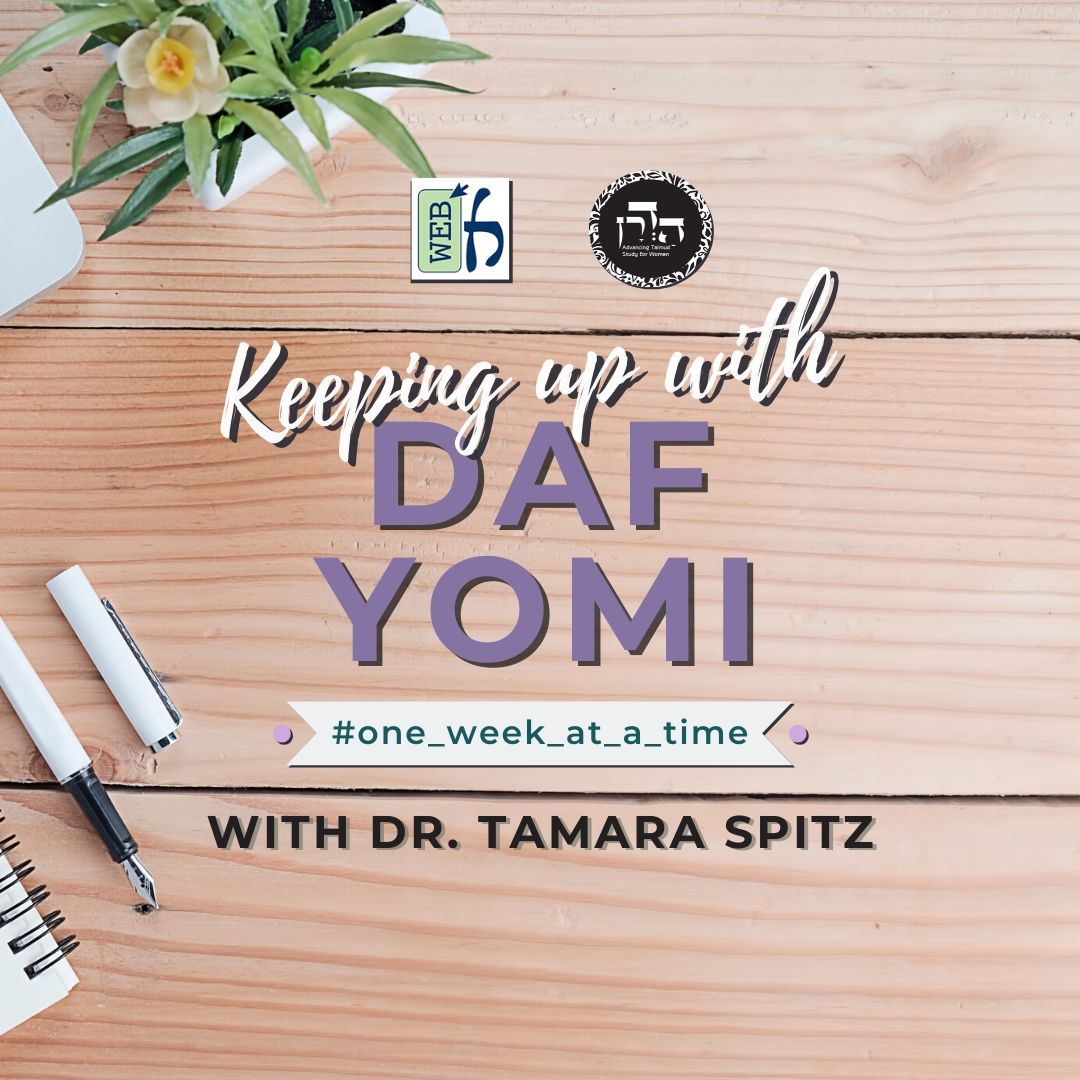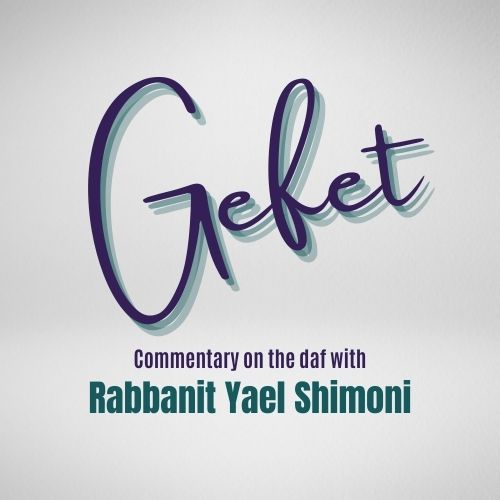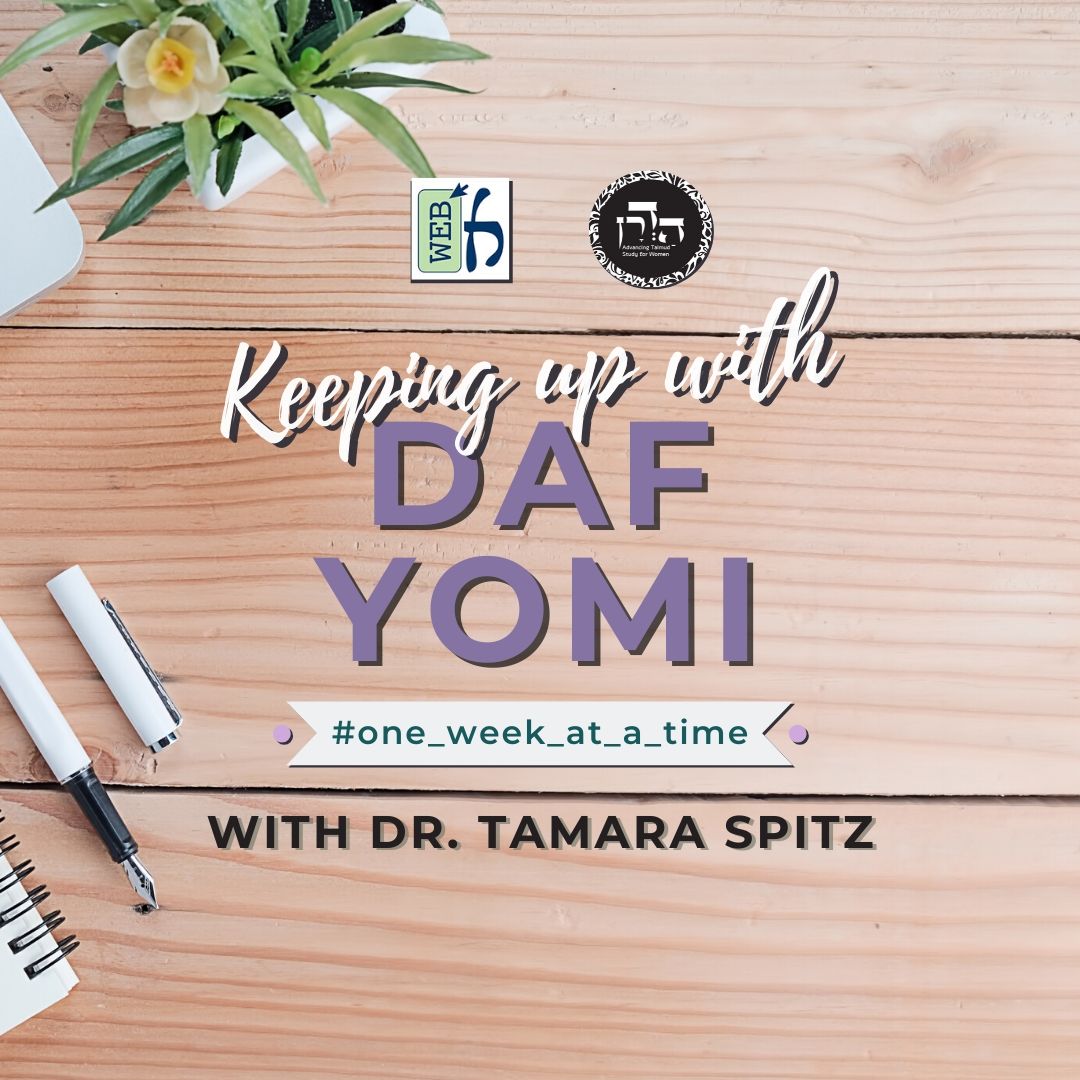Is the braita that Rav Yosef quoted actually reflecting the same debate that Rabbi Akiva and Ben Nanas were arguing about – whether in a case where one wife died before the husband died and another after the husband died, can the sons of the first one collect their ketuba of male children? Several alternative explanations are brought for the debate in the braita. Mar Zutra brings a ruling on this issue and the Gemara explains why he needed to rule about two issues – why couldn’t we have inferred one from the other? To collect the ketuba of male children, there needs to be one dinar more than the ketubas that need collecting. The orphans cannot try to inflate the amount to try to collect their ketuba. What if the amount of the estate went up or down in value after the death and there was/was not an extra dinar? Two stories are brought related to inflation of the value of a property (not in a case regarding orphans) and there were those who wanted to rule from our Mishna that inflation of property is not allowed. However, others differentiated between the case at hand and the one in the Mishna.
This week’s learning is sponsored for the merit and safety of Haymanut (Emuna) Kasau, who was 9 years old when she disappeared from her home in Tzfat two years ago, on the 16th of Adar, 5784 (February 25, 2024), and whose whereabouts remain unknown.
This week’s learning is dedicated of the safety of our nation, the soldiers and citizens of Israel, and for the liberation of the Iranian people. May we soon see the realization of “ליהודים היתה אורה ושמחה וששון ויקר”.
Want to dedicate learning? Get started here:


Summary
Today’s daily daf tools:
This week’s learning is sponsored for the merit and safety of Haymanut (Emuna) Kasau, who was 9 years old when she disappeared from her home in Tzfat two years ago, on the 16th of Adar, 5784 (February 25, 2024), and whose whereabouts remain unknown.
This week’s learning is dedicated of the safety of our nation, the soldiers and citizens of Israel, and for the liberation of the Iranian people. May we soon see the realization of “ליהודים היתה אורה ושמחה וששון ויקר”.
Today’s daily daf tools:
Delve Deeper
Broaden your understanding of the topics on this daf with classes and podcasts from top women Talmud scholars.
New to Talmud?
Check out our resources designed to help you navigate a page of Talmud – and study at the pace, level and style that fits you.
The Hadran Women’s Tapestry
Meet the diverse women learning Gemara at Hadran and hear their stories.
Ketubot 91
וְהָכָא בְּדִינָר מְקַרְקְעֵי קָמִיפַּלְגִי. מָר סָבַר: מְקַרְקְעֵי — אִין, מִטַּלְטְלֵי — לָא. וּמָר סָבַר: אֲפִילּוּ מִטַּלְטְלִי.
and here they disagree about a dinar’s worth of real estate: One Sage, the first tanna, holds that if the surplus was in the form of real estate, meaning that there was sufficient real estate to cover the sums specified in the marriage contracts and one dinar’s worth of land was still left over, then yes, each can claim his mother’s marriage contract, but if the surplus of the dinar was only in movable property, then no, they cannot; and one Sage, Rabbi Shimon, holds that the heirs may claim the marriage contracts even if the surplus is in movable property.
וּמִי מָצֵית אָמְרַתְּ הָכִי? וְהָתְנַן, רַבִּי שִׁמְעוֹן אוֹמֵר: אֲפִילּוּ יֵשׁ שָׁם נְכָסִים שֶׁאֵין לָהֶם אַחְרָיוּת — אֵינָן כְּלוּם, עַד שֶׁיְּהֵא שָׁם נְכָסִים שֶׁיֵּשׁ לָהֶן אַחְרָיוּת יָתֵר עַל שְׁתֵּי כְּתוּבּוֹת דִּינָר!
The Gemara asks: But how can you say that? Didn’t we learn in the mishna (91a) that Rabbi Shimon says: Even if there is property that does not serve as a guarantee for a loan, i.e., movable property, it is considered as nothing, unless there is property that serves as a guarantee for a loan with a promissory note, i.e., land, exceeding the value of the two marriage contracts by at least one additional dinar.
אֶלָּא, הָכָא בְּדִינָר מְשַׁעְבְּדִי קָמִיפַּלְגִי. מָר סָבַר: מִבְּנֵי חוֹרִין — אִין, מִמְּשַׁעְבְּדִי — לָא, וּמָר סָבַר: אֲפִילּוּ מִמְּשַׁעְבְּדִי.
Rather, here they disagree about a dinar of liened property: One Sage, the first tanna, holds that if the surplus was in the form of unsold property, then yes, each can claim the sum specified in his mother’s marriage contract, but if the surplus was only in liened property then no, he cannot. And one Sage, Rabbi Shimon, holds that it is deemed a surplus even if it was in the form of liened property.
אִי הָכִי, רַבִּי שִׁמְעוֹן אוֹמֵר: ״אִם יֵשׁ שָׁם מוֹתַר דִּינָר״ — ״כֵּיוָן שֶׁיֵּשׁ שָׁם מוֹתַר דִּינָר״ מִיבְּעֵי לֵיהּ!
The Gemara asks: If that is so, the baraita should not have stated Rabbi Shimon’s opinion using the conditional: Rabbi Shimon says: If there is a surplus of a dinar. In this case such a surplus certainly exists, and therefore it should have said: Since there is a surplus of a dinar.
אֶלָּא: בְּפָחוֹת מִדִּינָר קָמִיפַּלְגִי, מָר סָבַר: דִּינָר — אִין, פָּחוֹת מִדִּינָר — לָא, וּמָר סָבַר: אֲפִילּוּ פָּחוֹת מִדִּינָר.
Rather, the dispute can be explained differently: They disagree about a case where there is less than a dinar of surplus: One Sage, the first tanna, holds that if the surplus was worth a dinar, then yes, each can claim his mother’s marriage contract, but if it was less than a dinar then no, he cannot. And one Sage, Rabbi Shimon, holds that it is deemed a surplus even if it was less than a dinar.
וְהָא רַבִּי שִׁמְעוֹן ״דִּינָר״ קָאָמַר! וְכִי תֵּימָא: אֵיפוֹךְ, תַּנָּא קַמָּא דְּמַתְנִיתִין נָמֵי דִּינָר קָאָמַר!
The Gemara asks: But Rabbi Shimon said: If there is a surplus of a dinar, and not less. And if you would say: Reverse the interpretation of the opinion of the first tanna in the baraita cited above, that would be unacceptable, because the first tanna of the mishna (91a), who is presumably identical to the first tanna of the baraita, also said that the surplus must be at least one dinar.
אֶלָּא כִּי הָנָךְ תְּרֵי לִישָּׁנֵאי קַמָּאֵי וְאֵיפוֹךְ.
The Gemara concludes: Rather, the dispute in the baraita must be explained according to those first two formulations cited above, that they disagree about a surplus in movable property or about a surplus in liened property. And reverse the interpretation of the opinion of the first tanna, so that he holds that the sons of the first wife may collect her marriage settlement if there is a surplus in their father’s estate of one dinar worth of movable property or liened property, whereas Rabbi Shimon holds that there must be a surplus of one dinar worth of land that is not liened.
אָמַר מָר זוּטְרָא מִשְּׁמֵיהּ דְּרַב פָּפָּא, הִלְכְתָא: אַחַת בְּחַיָּיו וְאַחַת בְּמוֹתוֹ — יֵשׁ לָהֶן כְּתוּבַּת בְּנִין דִּכְרִין, וּכְתוּבָּה נַעֲשֵׂית מוֹתָר לַחֲבֶרְתָּהּ.
Mar Zutra said in the name of Rav Pappa: The halakha in the case where one wife died in his lifetime and one died following his death is that the sons of the first wife are entitled to the collect the marriage contract concerning male children, and furthermore, that one marriage contract becomes surplus for the other.
בִּשְׁלָמָא אִי אַשְׁמְעִינַן אַחַת בְּחַיָּיו וְאַחַת בְּמוֹתוֹ יֵשׁ לָהֶן כְּתוּבַּת בְּנִין דִּיכְרִין, וְלָא אַשְׁמְעִינַן כְּתוּבָּה נַעֲשֵׂית מוֹתָר לַחֲבֶרְתָּהּ, הֲוָה אָמֵינָא: אִי אִיכָּא מוֹתַר דִּינָר — אִין, אִי לָא — לָא.
The Gemara wonders: Granted, if Mar Zutra would have taught us only that in a case where one wife died in his lifetime and one died following his death, the sons of the first wife are entitled to collect the marriage contract concerning male children, and he would not have taught us that one marriage contract becomes surplus for the other, I would say that if there is a surplus of a dinar after the payment of both marriage settlements, then yes, the sons of the first wife can claim their mother’s marriage settlement, but if not, then no, they cannot.
אֶלָּא לַישְׁמְעִינַן כְּתוּבָּה נַעֲשֵׂית מוֹתָר לַחֲבֶרְתָּהּ, וַאֲנָא יָדַעְנָא מִשּׁוּם דְּאַחַת בְּחַיָּיו וְאַחַת בְּמוֹתוֹ יֵשׁ לָהֶן כְּתוּבַּת בְּנִין דִּכְרִין!
However, let him teach us only that one marriage contract becomes surplus for the other, and I would know that it is due to the fact that if one wife died in his lifetime and one died following his death, the sons of the first wife are entitled to claim payment of the marriage contract concerning male children.
אִי אַשְׁמְעִינַן הָכִי, הֲוָה אָמֵינָא: כְּגוֹן שֶׁנָּשָׂא שָׁלֹשׁ נָשִׁים, וָמֵתוּ שְׁתַּיִם בְּחַיָּיו וְאַחַת בְּמוֹתוֹ. וְהָךְ דְּמָיֵית לְאַחַר מִיתָה — יוֹלֶדֶת נְקֵבָה הִיא, וְלָאו בַּת יְרוּשָּׁה הִיא.
The Gemara answers: If he would have taught us only that, that a marriage contract can serve as a surplus, I would say that this applies specifically in a case where an individual married three women, and two of them died in his lifetime and one after his death, and that wife who died after his death had given birth to a daughter but no sons, and the daughter does not inherit any part of the estate. Although the daughter is entitled to be sustained from her father’s estate, she has no claim to a share in the inheritance. Consequently, there is no concern for quarreling, as all the heirs are in the same situation.
אֲבָל אַחַת בְּחַיָּיו וְאַחַת בְּמוֹתוֹ, וְהָא דִּלְאַחַר מִיתָה יוֹלֶדֶת זָכָר הִיא — אֵימָא לֵיחוּשׁ לְאִינְּצוֹיֵי, קָא מַשְׁמַע לַן.
However, in a case where one wife died in his lifetime and one died after his death, where the one who died after his death had given birth to a son who is suing for his portion of the estate, one could say that there is a concern about quarreling arising from the complaints of the son of the second wife. Therefore, Mar Zutra mentions both halakhot explicitly in order to teach us that this concern is not taken into account.
מַתְנִי׳ מִי שֶׁהָיָה נָשׂוּי שְׁתֵּי נָשִׁים, וָמֵתוּ, וְאַחַר כָּךְ מֵת הוּא, וִיתוֹמִים מְבַקְּשִׁין כְּתוּבַּת אִמָּן וְאֵין שָׁם אֶלָּא שְׁתֵּי כְתוּבּוֹת — חוֹלְקִין בְּשָׁוֶה.
MISHNA: In the case of one who was married to two women and the women died, and subsequently he died, and the orphans of one of the wives are now seeking to collect the payment specified in their mother’s marriage contract, i.e., the marriage contract concerning male children, but there is only enough in the estate to pay the value of the two marriage contracts, the marriage contract concerning male children cannot be collected, and the sons distribute the estate equally among themselves according to the biblical laws of inheritance.
הָיָה שָׁם מוֹתַר דִּינָר — אֵלּוּ נוֹטְלִים כְּתוּבַּת אִמָּן וְאֵלּוּ נוֹטְלִים כְּתוּבַּת אִמָּן.
If there was a surplus of a dinar left there, in the estate, beyond the value of the two marriage contracts, then these sons collect their mother’s marriage contract and those sons collect their mother’s marriage contract, and the remaining property valued at a dinar is divided equally among all the sons.
אִם אָמְרוּ יְתוֹמִים: אֲנַחְנוּ מַעֲלִים עַל נִכְסֵי אָבִינוּ יָפֶה דִּינָר כְּדֵי שֶׁיִּטְּלוּ כְּתוּבַּת אִמָּן — אֵין שׁוֹמְעִין לָהֶן, אֶלָּא שָׁמִין אֶת הַנְּכָסִים בְּבֵית דִּין.
If the orphans who are entitled to receive the marriage settlement of greater value say: We inflate the value of our father’s property by a dinar, i.e., we agree to evaluate the property we will receive for our mother’s marriage settlement at a value higher than the market value so that there will be a dinar left in the estate after the two marriage contracts have been paid, so that they can collect their mother’s marriage contract, the court does not listen to them. Rather, the value of the property is appraised in court, and the distribution of the estate is based on that evaluation.
הָיוּ שָׁם נְכָסִים בְּרָאוּי — אֵינָן כִּבְמוּחְזָק.
If there was potential inheritance there, meaning that there was no surplus of a dinar in the existing properties of the estate, but there was property that was expected to be paid to the estate and which would increase the overall value of the estate so that there would be a surplus of a dinar after the payment of the marriage contracts, these properties are not considered to be in the possession of the estate in determining the total value of the estate.
רַבִּי שִׁמְעוֹן אוֹמֵר: אֲפִילּוּ יֵשׁ שָׁם נְכָסִים שֶׁאֵין לָהֶם אַחְרָיוּת, אֵינָן כְּלוּם, עַד שֶׁיִּהְיוּ שָׁם נְכָסִים שֶׁיֵּשׁ לָהֶן אַחְרָיוּת יוֹתֵר עַל שְׁתֵּי הַכְּתוּבּוֹת דִּינָר.
Rabbi Shimon says: Even if there is property that does not serve as guarantee for a loan, i.e., movable property, there in the estate, it does not have any impact on the value of the estate. The marriage contracts concerning male children are not collected unless there is property that serves as a guarantee, i.e., land, exceeding the value of the two marriage contracts by at least one additional dinar.
גְּמָ׳ תָּנוּ רַבָּנַן: לָזוֹ אֶלֶף וְלָזוֹ חֲמֵשׁ מֵאוֹת, אִם יֵשׁ שָׁם מוֹתַר דִּינָר — אֵלּוּ נוֹטְלִין כְּתוּבַּת אִמָּן וְאֵלּוּ נוֹטְלִין כְּתוּבַּת אִמָּן. וְאִם לָאו — יַחְלְקוּ בְּשָׁוֶה.
GEMARA: The Sages taught in a baraita: If this wife had a marriage contract valued at one thousand dinars and that wife had a marriage contract valued at five hundred dinars, if there is a surplus of one dinar, then these sons collect their mother’s marriage contract and those sons collect their mother’s marriage contract. And if not, they divide the inheritance equally.
פְּשִׁיטָא: מְרוּבִּין וְנִתְמַעֲטוּ — כְּבָר זָכוּ בָּהֶן יוֹרְשִׁין. מוּעָטִין וְנִתְרַבּוּ מַאי?
The Gemara notes: It is obvious that if there were abundant properties, i.e., there was a surplus of a dinar above the value of the two marriage settlements at the time of the man’s death, but they depreciated before the sons collected the marriage settlements, the heirs have already acquired rights to the marriage settlements. However, what is the halakha if the estate’s holdings were few, i.e., there was no surplus at the time of the man’s death, but they appreciated before the sons divided the estate, so that there was a surplus? Do the sons collect the mothers’ marriage settlements?
תָּא שְׁמַע: דְּנִיכְסֵי דְּבֵי בַּר צַרְצוּר מוּעָטִין וְנִתְרַבּוּ הֲווֹ, וַאֲתוֹ לְקַמֵּיהּ דְּרַב עַמְרָם. אֲמַר לְהוּ: זִילוּ פַּיְּיסִינְהוּ. לָא אַשְׁגַּחוּ.
The Gemara suggests: Come and hear a solution based upon the following case: The properties of the house of bar Tzartzur were few, i.e., there was no surplus beyond his wives’ marriage settlements, and they appreciated. The sons of the two wives came before Rav Amram to discuss the matter. He said to the sons of the wife who had the more valuable marriage contract: Go appease the sons of the other wife and give them some of your share. They did not heed his advice.
אֲמַר לְהוּ: אִי לָא מְפַיְּיסִיתוּ לְהוּ, מָחֵינָא לְכוּ בְּסִילְוָא דְּלָא מַבַּע דְּמָא. שַׁדְּרִינְהוּ לְקַמֵּיהּ דְּרַב נַחְמָן, אָמַר לָהֶן: כְּשֵׁם שֶׁמְּרוּבִּין וְנִתְמַעֲטוּ
He said to them: If you will not appease them, I will strike you with a thorn [silva] that does not draw blood, i.e., I will excommunicate you. He sent them before Rav Naḥman. Rav Naḥman said to them: Just as the halakha is that if the properties were abundant but depreciated,
זָכוּ בָּהֶן יוֹרְשִׁין — כָּךְ מוּעָטִין וְנִתְרַבּוּ זָכוּ בָּהֶן יוֹרְשִׁין.
the heirs acquired rights to the mothers’ marriage contracts due to the value of the estate when their father died, so too, in a case where the properties were few and the value subsequently appreciated, the heirs have acquired rights to divide the entire estate equally, due to the value of the estate when their father died.
(סִימַן: אֶלֶף וּמֵאָה מִצְוָה בִּכְתוּבָּה יַעֲקֹב זָקַף שְׂדוֹתָיו בִּדְבָרִים עֲסִיקִין).
§ This is a mnemonic device for the following halakhot, which are connected in one way or another to the problem being dealt with in the mishna: One thousand, and one hundred, mitzva, in the marriage contract, Ya’akov, set up, his fields, with words, disputants.
הָהוּא גַּבְרָא דַּהֲווֹ מַסְּקִי בֵּיהּ אַלְפָּא זוּזֵי, הֲווֹ לֵיהּ תְּרֵי אַפַּדְנֵי, זַבְּנִינְהוּ חֲדָא בַּחֲמֵשׁ מְאָה וַחֲדָא בַּחֲמֵשׁ מְאָה. אֲתָא בַּעַל חוֹב טַרְפַאּ לַחֲדָא מִינַּיְיהוּ, הֲדַר קָטָרֵיף לְאִידַּךְ.
There was a certain man who had a creditor with a claim of one thousand dinars against him. He had two mansions [appedanei]. He sold them, one for five hundred and the other one also for five hundred. The creditor came and repossessed one of them from the purchaser, as the repayment of part of his debt. He subsequently sought to repossess the other mansion as well, in payment for the remainder of his debt.
שְׁקַל אַלְפָּא זוּזֵי וְקָא אָזֵיל לְגַבֵּיהּ, אֲמַר לֵיהּ: אִי שַׁוְיָא לָךְ אַלְפָּא זוּזֵי — לְחַיֵּי, וְאִי לָא — שְׁקֹיל אַלְפָּא זוּזֵי וְאִיסְתַּלַּק.
The purchaser took one thousand dinars and went to the creditor. He said to him: If the first mansion that you repossessed is worth one thousand dinars to you, very well, let it be yours in exchange for the entire sum that is owed to you, and if not, take these one thousand dinars and abrogate your rights to both of the mansions, leaving them both in my possession.
סְבַר רָמֵי בַּר חָמָא לְמֵימַר: הַיְינוּ מַתְנִיתִין אִם אָמְרוּ יְתוֹמִים ״הֲרֵי אָנוּ מַעֲלִין עַל נִכְסֵי אָבִינוּ יָפֶה דִּינָר״.
Rami bar Ḥama thought to say that this case is identical to that which is taught in the mishna: If the orphans say: We inflate the value of our father’s property by a dinar, the court does not listen to them. This appears to be the case here as well, and the value of the mansion should not be assessed at higher than its market value.
אֲמַר לֵיהּ רָבָא: מִי דָּמֵי? הָתָם — אִית לְהוּ פְּסֵידָא לְיַתְמֵי, הָכָא — מִי אִית לֵיהּ פְּסֵידָא? אַלְפָּא יָהֵיב וְאַלְפָּא שָׁקֵיל!
Rava said to him: Are the two cases comparable? There, in the mishna, the other orphans whose mother’s marriage contract was of lesser value will suffer a financial loss if the property is assessed at a value greater than it is actually worth. Here, in the case of the creditor, does he incur a loss? He lent one thousand dinars and took one thousand dinars; consequently, it would be cruel on his part to refuse to take the money and to insist on taking the second mansion from the purchaser.
וְטִירְפָא, בְּכַמָּה כָּתְבִינַן?
The Gemara asks: If the creditor decided to hold on to the first mansion and to forgive the remainder of the debt, what amount is written in the document of authorization to repossess liened property, through which the purchaser will claim compensation from the seller? The purchaser had paid only five hundred dinars for the mansion that was repossessed, but the repossession of that mansion earned the seller one thousand dinars, as his entire debt was paid off.
רָבִינָא אָמַר: בְּאַלְפָּא. רַב עַוִּירָא אָמַר: בַּחֲמֵשׁ מְאָה. וְהִלְכְתָא: בַּחֲמֵשׁ מְאָה.
Ravina said: It is written for one thousand dinars. Rav Avira said: It is written for five hundred dinars; the fact that the creditor forgave the full amount of the debt in exchange for this house was his own personal decision and does not reflect an increase in the property value of the house. The Gemara concludes: The halakha is that it is written for five hundred dinars.
הָהוּא גַּבְרָא דַּהֲווֹ מַסְּקִי בֵּיהּ מְאָה זוּזֵי. הֲווֹ לֵיהּ תְּרֵי קַטִּינֵי דְאַרְעָא, (חַד זַבֵּינְהוּ) [זַבְּנִינְהוּ לְחַד] בְּחַמְשִׁין וְחַד בְּחַמְשִׁין. אֲתָא בַּעַל חוֹב טַרְפַאּ לְחַד מִינַּיְיהוּ, הֲדַר אֲתָא וְקָטָרֵיף לְאִידַּךְ.
It is also related that there was a certain man who had a creditor with a claim of one hundred dinars against him. He had two small tracts of land. He sold one for fifty and he also sold the other one for fifty. The creditor came and repossessed one of them from the purchaser as the collection of part of his debt. He subsequently came, seeking to repossess the other tract of land as well, as payment for the rest of the debt owed to him.
שְׁקַל מְאָה זוּזֵי וְקָאָזֵיל לְגַבֵּיהּ וַאֲמַר לֵיהּ: אִי שָׁוְיָא לָךְ מְאָה זוּזֵי — לְחַיֵּי, וְאִי לָא — שְׁקוֹל מְאָה זוּזֵי וְאִיסְתַּלַּק.
The purchaser took one hundred dinars and went to the creditor. He said to him: If this tract is worth one hundred dinars to you, very well, and if not, take one hundred dinars and abrogate your rights to both of the tracts, leaving them both in my possession.
סָבַר רַב יוֹסֵף לְמֵימַר: הַיְינוּ מַתְנִיתִין אִם אָמְרוּ יְתוֹמִים כּוּ׳. אֲמַר לֵיהּ אַבָּיֵי: מִי דָּמֵי? הָתָם — אִית לְהוּ פְּסֵידָא לְיַתְמֵי, הָכָא — מַאי פְּסֵידָא אִית לֵיהּ? מְאָה יָהֵיב, מְאָה שָׁקֵיל.
Rav Yosef thought to say that this case is identical to that which is taught in the mishna, whereby if the orphans say: We inflate the value of our father’s property by a dinar, the court does not listen to them. Abaye said to him: Are the two cases comparable? There, in the mishna, the other orphans suffer a financial loss if the property is assessed at a value greater than it is actually worth; here, what loss does the creditor incur? He lent one hundred dinars and took one hundred dinars. It would be cruel on his part to refuse to take the money and to insist on taking the land from the purchaser.
וְטִירְפָּא בְּכַמָּה כָּתְבִינַן? רָבִינָא אָמַר: בִּמְאָה, רַב עַוִּירָא אָמַר: בְּחַמְשִׁין. וְהִלְכְתָא בְּחַמְשִׁין.
The Gemara asks: If the creditor decided to hold on to the first tract of land and to forgive the remainder of the debt, what amount is written in the document of authorization to repossess liened property, through which the purchaser will claim compensation from the seller? Ravina said that it is written for one hundred. Rav Avira said it is written for fifty. The Gemara concludes: The halakha is that it is written for fifty dinars.
הָהוּא גַּבְרָא דַּהֲווֹ מַסְּקִי בֵּיהּ מְאָה זוּזֵי. שָׁכֵיב, שְׁבַק קַטִּינָא דְּאַרְעָא דַּהֲוָה שָׁוְיָא חַמְשִׁין זוּזֵי. אֲתָא בַּעַל חוֹב וְקָטָרֵיף לֵיהּ, אֲזוּל יַתְמֵי יְהַבוּ לֵיהּ חַמְשִׁין זוּזֵי, הֲדַר קָטָרֵיף לַהּ.
The Gemara relates that there was a certain man who had a creditor with a claim of one hundred dinars against him. He died and left a small tract of land worth fifty dinars. The creditor came and repossessed it. The orphans came and gave him fifty dinars and redeemed the property from him. He returned and repossessed it again in order to collect the remainder of the debt.
אֲתוֹ לְקַמֵּיהּ דְּאַבָּיֵי. אָמַר לָהֶן: מִצְוָה עַל הַיְּתוֹמִים לִפְרוֹעַ חוֹב אֲבִיהֶן. הָנֵי קַמָּאֵי מִצְוָה עָבְדִיתוּ, הַשְׁתָּא כִּי טָרֵיף — בְּדִין קָטָרֵיף.
They came before Abaye to complain. He said to them: It is a mitzva for orphans to settle their father’s debt. Consequently, with the money you paid the creditor initially, you performed a mitzva, as you partially settled a debt your father owed. However, this payment did not cancel the lien on the property, and so now, when he repossesses the land, he is repossesses it lawfully.
וְלָא אֲמַרַן דְּלָא אֲמַרוּ לֵיהּ: ״הָנֵי חַמְשִׁין זוּזֵי דְּמֵי דְּאַרְעָא קַטִּינָא״, אֲבָל אֲמַרוּ לֵיהּ: ״הָנֵי חַמְשִׁין זוּזֵי דְּמֵי אַרְעָא קַטִּינָא״ — סַלּוֹקֵי סַלְּקוּהּ.
The Gemara notes: And we said this ruling only in a case where the orphans did not say to the creditor: These fifty dinars are payment for the small tract of land. However, if they said to him: These fifty dinars are payment for the small tract of land, they have successfully removed him from the land and he has no further claim to it.
הָהוּא גַּבְרָא דְּזַבְּנַהּ לִכְתוּבְּתַהּ דְּאִימֵּיהּ בְּטוֹבַת הֲנָאָה, וַאֲמַר לֵיהּ: אִי אָתְיָא אֵם וּמְעַרְעֲרָא, לָא מְפַצֵּינָא לָךְ.
§ The Gemara relates that there was a certain man who sold the rights to his mother’s marriage contract for a certain financial advantage, i.e., he received a certain sum on the condition that if he would inherit his mother’s marriage contract, which would occur if his mother’s husband would die prior to his mother, the purchaser would obtain the right to collect the money. And he told the purchaser: If my mother comes and objects to the sale, I will not reimburse you for your purchase.
שְׁכִיבָא אִימֵּיהּ וְלָא (אִי)עַרְעַרָא, וַאֲתָא אִיהוּ וְקָא מְעַרְעַר. סְבַר רָמֵי בַּר חָמָא לְמֵימַר: אִיהוּ בִּמְקוֹם אִימֵּיהּ קָאֵי. אֲמַר לֵיהּ רָבָא: נְהִי דְּאַחְרָיוּת דִּידַהּ לָא קַבֵּיל עֲלֵיהּ, אַחְרָיוּת דִּידֵיהּ מִי לָא קַבֵּיל?
His mother died after her husband died, and had not objected to the sale. He, however, came and contested the sale. Rami bar Ḥama thought to say that he stands in his mother’s place and since he is her proxy, he has the right to object to the sale. Rava said to him: Granted that he did not take upon himself to guarantee the sale against his mother’s objections, but did he not take upon himself to guarantee it against his own objections? When he sold the right to collect the marriage contract, he most certainly guaranteed that he would not renege on the sale.
אָמַר רָמֵי בַּר חָמָא: רְאוּבֵן שֶׁמָּכַר שָׂדֶה לְשִׁמְעוֹן שֶׁלֹּא בְּאַחְרָיוּת, וַאֲתָא שִׁמְעוֹן וּמְכָרָהּ לִרְאוּבֵן בְּאַחְרָיוּת,
The Gemara relates a similar discussion. Rami bar Ḥama said: If Reuven sold a field to Shimon without a guarantee, and Shimon came and sold the field back to Reuven, but he sold it with a guarantee that if the field is repossessed, he will compensate the buyer for his loss,


